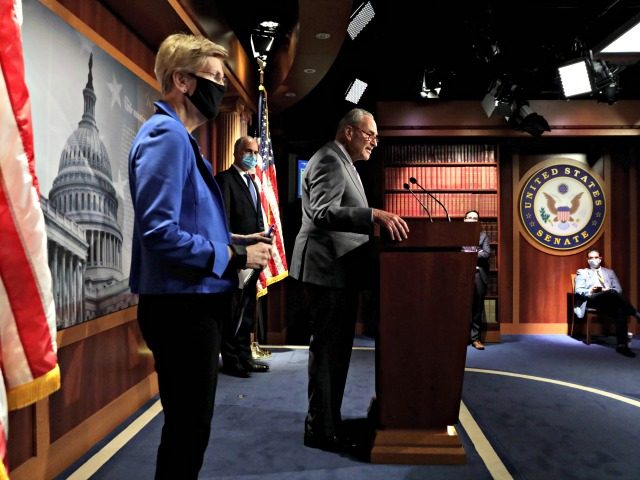Sens. Chuck Schumer (D-NY) and Elizabeth Warren (D-MA) told reporters on Thursday that the “new president” will be willing to put a resolution they are sponsoring into executive policy and forgive up to $50,000 in student loan debt for 45 million borrowers.
The debt forgiveness, Schumer said, would be “a lifeline to lift you up” instead of “an anchor to hold you down,” and added that the granting of free educations would “wipe out” the entire debt for 75 percent of loan holders.
“We have a responsibility to act,” Warren said, to “improve the lives of millions of Americans.”
Especially to improve the lives of “communities of color,” who are the most indebted and are now also facing the coronavirus outbreak, she added.
The Democrats also said forgiving student loan would “boost the economy,” and “start to close the racial wealth gap.”
Warren and Schumer admitted that it would take Joe Biden winning the White House to put their plan in place and twice referred to the “new president” who would make it happen in 2021.
They also trashed President Donald Trump.
“President Trump has failed the test on student debt cancellation,” Schumer said, ignoring the president’s memorandum to the Department of Education on August 8:
On March 20, 2020, my Administration took action to provide immediate relief to tens of millions of student loan borrowers during the pandemic caused by COVID-19 by both suspending loan payments and temporarily setting interest rates to 0 percent. This relief has helped many students and parents retain financial stability. And many other Americans have continued to routinely pay down their student loan balances, to more quickly eliminate their loans in the long run. During this time, borrowers have been able to determine the best path forward for themselves.
The original announcement of this policy specified that it would continue for at least 60 days. In the interim, the Coronavirus Aid, Relief, and Economic Security Act provided this same student loan payment relief, but that program is scheduled to expire on September 30, 2020. Currently, many Americans remain unemployed due to the COVID-19 pandemic, and many more have accepted lower wages and reduced hours while States and localities continue to impose social distancing measures. It is therefore appropriate to extend this policy until such time that the economy has stabilized, schools have re-opened, and the crisis brought on by the COVID-19 pandemic has subsided.
In light of the national emergency declared on March 13, 2020, the Secretary of Education shall take action pursuant to applicable law to effectuate appropriate waivers of and modifications to the requirements and conditions of economic hardship deferments described in section 455(f)(2)(D) of the Higher Education Act of 1965, as amended, 20 U.S.C. 1087e(f)(2)(D), and provide such deferments to borrowers as necessary to continue the temporary cessation of payments and the waiver of all interest on student loans held by the Department of Education until December 31, 2020.
The Democrats also noted at the press conference that student loans have the highest rate of default of any other debt and that government loans — the federal government approving long-term, high-interest loans often to high risk borrowers — represent 92 percent of student loans.
Schumer, for the second time, said the debt relief will come from the “new president.”
“We’ll ask the new president to use your power to cancel the debt,” Schumer said. “We believe it to be Joseph R. Biden.”
The 45 million borrowers represent a $1.6 trillion student loan debt in the United States.
Follow Penny Starr on Twitter

COMMENTS
Please let us know if you're having issues with commenting.